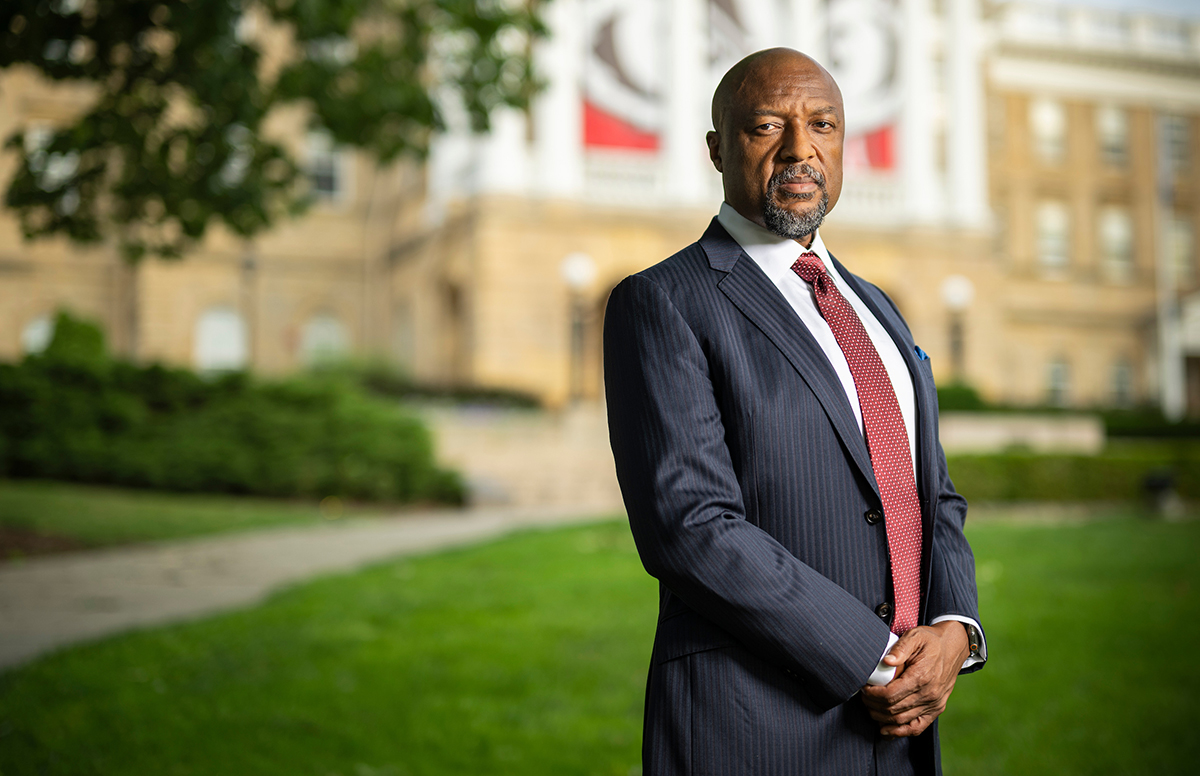What It Means to Succeed
New Provost Charles Isbell will help UW–Madison define itself in a brave new world.

Isbell knows that people are the heart of intelligent systems, both in computers and on a college campus.
Charles Isbell knows that good science fiction is less about the futuristic than it is the timeless. Beneath the fantasies lie inherently human stories of power and morality.
Isbell’s career has grappled with the same in its pursuit of technological advancement. As an accomplished computationalist and decorated scholar of artificial intelligence (AI) and machine learning, Isbell is interested in building and sustaining smart systems, whether those systems exist within a computer or across a campus community. He comes to the UW from the Georgia Institute of Technology, where he most recently served as the dean of the College of Computing. As the UW’s new provost, Isbell is tasked with leading all 13 of its schools and colleges. The role requires understanding intelligent systems while also remaining cognizant of their human factor.
And how much does he believe in technology? He keeps a lightsaber on his desk for cutting red tape.
You’ve said AI builds intelligent systems that learn from both their environment and from people. Has this perspective influenced your approach to leadership?
People are at the center of everything. That’s what gives computing and technology meaning: the fact that the human being is what’s making all of the rest of this worthwhile. And if you think about it that way, then you realize very quickly that that’s how you have to lead. That’s how you have to build organizations. You have to think about the people and where they fit and change the organizations to work around the people.
Will AI change academia?
It will both change nothing and change everything. All computers really do is they allow us to do the things that we already do much more efficiently, both the good things and the bad things. That plays out in academia in three different ways. One, it affects the kind of research that we do and the way we do that research. Two, it affects the way we can administer and build systems that determine the way the university itself works. And three, it affects the way the students interface with us and the rest of the world.
How have your experiences of being the first or only Black person in a space or position influenced your philosophy on leading an institution?
What my experience has given me is an appreciation for how a variety of perspectives and experiences can change the conversation. I’ve said that we don’t have to wait 20 years to see how technology is being misused. There are lots and lots of examples of it now, and so much of it boils down to not having the right people in the room to point out the silly thing that you’re doing because you’re just not thinking about it.
To me, these kinds of questions boil down to questions of invisibility. People think of invisibility as, “You’re in front of me, and I don’t see you,” but that’s not the invisibility that matters. The invisibility that matters is that you are not in the room, and I don’t notice your absence. I hope that when I’m asked to make a decision or I’m having a discussion, I notice the people who aren’t in the room as much as I do the people who are.
You once concluded that you need only observe someone for two days to predict what they’ll do next. If we were to observe you for two days, what might we be able to deduce about your plans for the university?
What you would learn is two things. I am really interested in understanding the environment that I’m in. The second is that this is a great place. I try to only be in great places, but also places where I can bring something and help the people who are going to try to make it greater and make it greater faster than they would’ve otherwise. I am here to support the traditions, to keep what is fundamental about this place the same, but to help it to adapt as we move into the future and to set the stage for whoever’s going to follow me. That’s what I care about: effecting change for good purpose.
What excites you about being at the UW?
Winter.
Really?
No, not at all.
This is a place that touches everything that is a part of the human experience. I am excited to learn what that really means and how a place like this gets along with very different styles of scholarship, very different views of what it means to be preeminent, and very different views of what it means to succeed. What an opportunity, just to be a part of an environment like that.
Published in the Winter 2023 issue


Comments
No comments posted yet.